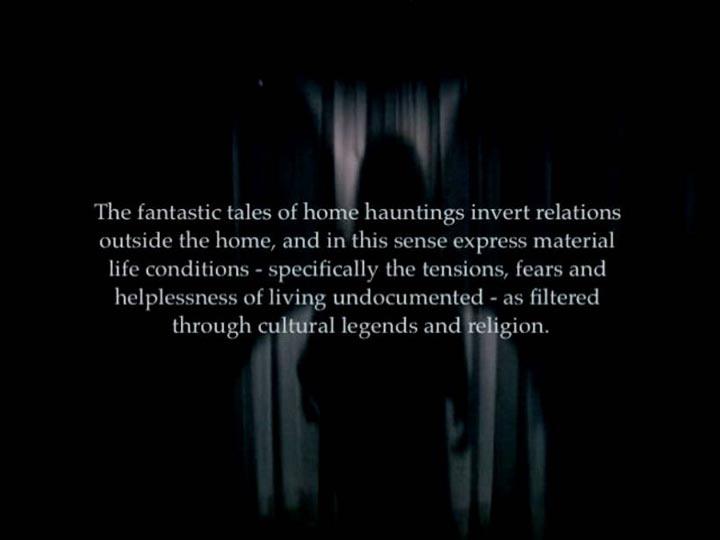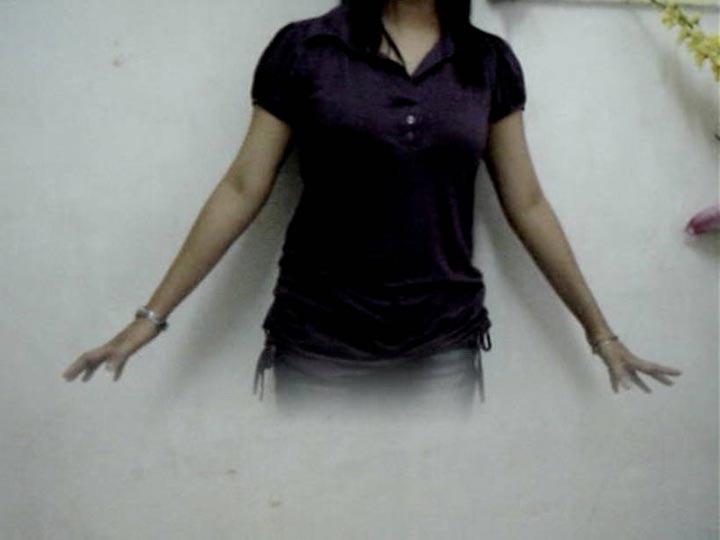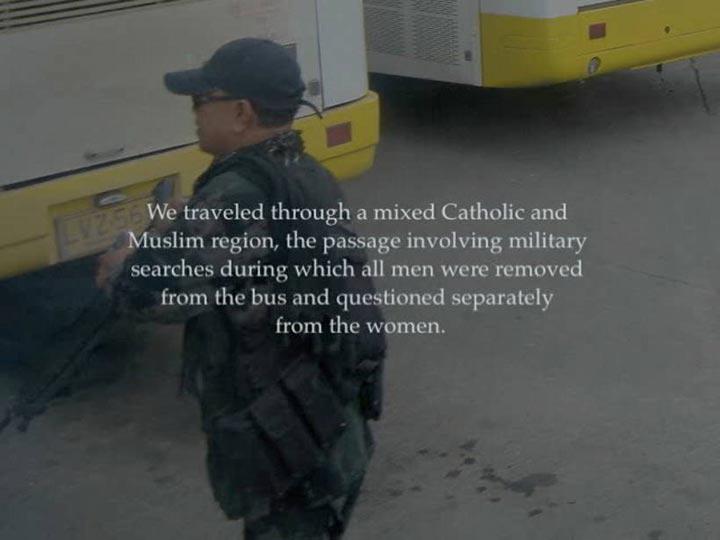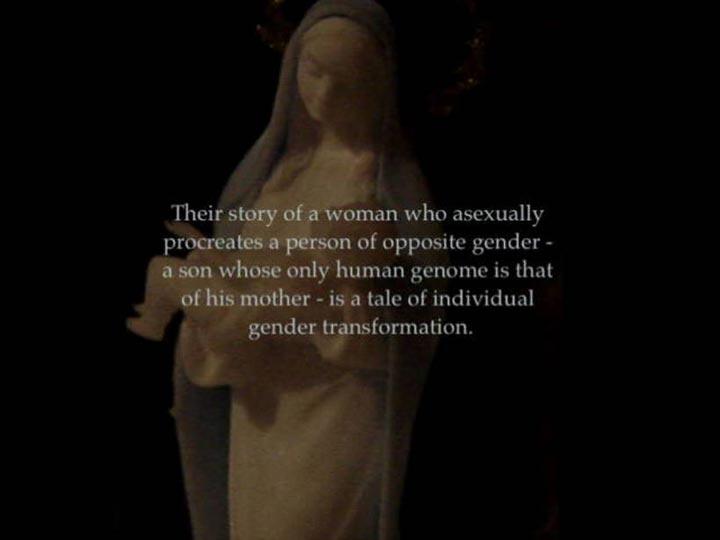Richard John Jones and Michael Oswell interview Terre Thaemlitz, 2011.
Terre Thaemlitz is a transgender performer, house DJ and extremely articulate commentator on audio within its specific economic, political and social contexts. This interview was conducted when Thaemlitz was touring with her latest project entitled ‘Soulnessless’. It was printed to accompany a screening that was part of Bodies Assembling – a project organised by Auto Italia and Cinenova during December 2011. All images are stills from the Soulnessless project.

Richard John Jones: Michael and I wanted to start by referring to your work around house music and how it is ‘hyperspecific’. If the aural can only be understood as an intersection of a whole variety of specific contexts (including identity politics) we were interested as to whether there can be an implicit reading in that with the ‘universalisation’ of recent and current social movements?
Terre Thaemlitz: You could say my work has been mostly about anti-universalism. I’ve done a lot of work around critiquing universalism, including liberal humanism and the way that it implies a shared human experience. Of course, any time you have a universalism – which is a kind of theoretical hypothesis of community – these involve processes of homogenization, and of course we do compromise all the time to get along with people. We make steps to homogenise in order to get along in this shared way, but this harmony is always at some point a ‘fake’ and its always important to keep in mind that it’s a fake. Of course the dominant western model is that you want to have ‘authenticity’ and ‘real connection’ and a ‘true shared experience,’ and for me this is a real conflict of interests within any sort of critical field because to take a critical stance is instantly aggressive and antisocial – antisocial in that it is against the dominant consensus or that it takes a position against something.
For me it is inherently negative, yet there is so much pressure to be optimistic. For example, you have to be focusing on ‘the future’ and on ‘your dreams’ and ‘where you want to go from here,’ and I’m much more interested in how you end the unbearable situations happening in the present rather than focusing on the Obama ‘hopenosis’ model of Yes We Can, which of course has been part of the queer agenda since the 80s and is really also pivotal to any sort of pride movement. Pride is also very much about optimism, very much about power sharing and very much about models of shared experience that have to do with conformity to the mainstream.
Michael Oswell: It’s interesting that you mention this circle of optimism which is primarily concerned with integration. Would you say that universalism is, from the very start, compromised?
T: It’s fascist. When taken to its extreme, humanism is also ultimately inherently fascist – and we live in a world where people are fundamentalist. So when you take it to the extreme, the ‘shared human experience’ is about a model of fascistic conformity that has nothing to do with the language of democratic diversity that it tries to exploit. But at the same time you have the post-humanist movement happening which is this kind of critique of it. Meanwhile, we are still in an era where so many people are still trying to be acknowledged as ‘human’ – especially within Women’s communities, Trans communities, and Lesbian and Gay culture although there is already much more acceptance around it. Like, now I would say we are culturally going through a kind of Trans boom, but these things are steps within the humanist legacy about recognizing who qualifies as ‘human.’
Laurence Rassel and I talk about this whole thing in the ‘Useless Movement’ project, and this is a cultural reality, so how do you then deal with this need to be simultaneous and duplicitous and also deceiving in terms of on the one hand having solidarity with people who do have a real material cultural and economic need to power-share while also knowing that putting energy into that kind of mainstream acceptance is also destructive to critical movements interested in divestments of power. That very necessary acceptance involves a concession to the dominant power structures needed to be changed in the first place. This is part of the transsexual movements and medical transitioning too – this conundrum of what is about power-sharing versus what is about unbecoming what was unbearable – and I think that this kind of tension will always come up when you mention something like universalisms, humanisms and these sort of things. Of course, people want to be optimistic, those are optimistic ideas which give people energy, but for me it is totally destructive. Totally alienating and depressing. This is a very old model where visibility and power are unquestioned.
R: Well this is really what I understand as essentialism. But then if we think about something like strategic essentialism, especially in queer activism, there is still a very real need for people to claim their humanity through, perhaps temporarily assuming a minority identity. This comes up often in a process of trying to politically organize. But is that conflict an eternal humanist/post-humanist struggle?
T: Well, I think that momentum is already on the side of the universal humanist argument, which makes it easier to play the over-critical asshole if you know it is the inherently weaker, losing position. I’m realistic about the fact that the struggle I’m invested in is something which is going to be lost, it will be swept to the side, so in this way it’s ok to be oppositional and confrontational with the understanding that it’s also futile. What is a problem for me – and what I’m about to say also shows that I have my own problems [laughs] – is that I would say most people think it’s healthy to try and reconcile with society, to feel accepted. It is healthy to find one’s place and go along with people in general, and this is the argument behind medical gender transitioning which in the majority of cases is about trying to take people out of a position of cultural and social alienation through body adjustments that allow them to fit into the cultural models around gender.
Fitting in aims to minimize alienation and I think that for most people, regardless of their sexuality or gender, it is the expected thing for them to want to do. But for me, identifying as someone who is completely unable to do this, it is so grotesque and brutal that it would mean a bullet to my head. So then, how does one deal with this gap between an obviously real and political need to address the violence of universalisms and humanisms – which I am taught to think of in personal terms although they clearly go beyond just myself – and the realization that addressing that violence forces one into an antisocial stance that is destined to fail? Speaking from personal experience, this is very difficult to do, and I think a lot of my work is not only talking about these things but also working through them myself in terms of my own social interactions.

R: I was interested in your point which I think related to the appropriation of the queer body in relation to dominant power structures. Michael and I were talking before the interview about the use of humanitarian discourse as used for an imperialistic objective. The justification of invasion being that of rescuing homosexuals in Iraq. Or pink washing in Isreal painting Tel Aviv as some gay liberal utopia within the oppressive Islamic east. Then the humanitarian discourse becomes intrinsically linked to violence and essentially imperialism.
T: I think that this idea of ‘shared experience’ is what creates that. When someone hasn’t experienced that kind of violence it becomes instantly abstracted. They say, ‘Well it must exist somewhere, but it’s not my experience, and if we have a shared experience then we’ll just talk about it on an abstract level.’ What we are really talking about here are very specific, isolated acts of directed violence for which its true that most people do not experience these in the extreme. Even many people who are identified as Gay, Lesbian, Trans, etc., don’t experience violence either through the safety offered by closeting or because they are operating within Pride communities where they are isolated within these bubbles of safety. Perhaps because they inhabit ‘safe spaces’ where they are surrounded by their peers for example, there are a lot of people who do not experience these things on a physical level to the same degree as others. This leads to the abstraction of other experiences, which is why I think its very important to get away from universalisms and humanisms as a way of connecting to people because they do instantly abstract, dilute and diffuse the violence which is very real. It’s a very real thing to have some asshole spit on your face, for example.
M: I wanted to know more about the use of the word solidarity. A lot of your work is about isolation, working against pride communities, the circle of optimism and so on. Is there any possibility for the collective within this? Are networks of solidarity a possibility for you?
T: For me, I’ve lived my whole life without ever finding a community and I’m still alive, doing things constantly, yet without this need – or without worrying about fulfilling the need. Although when I was younger, and especially in my early 20s doing activist work in New York, you could say I had fled from the US Midwest to try and find a place to connect with people.
M: I moved to London from Northumberland so I can relate to that.
R: Yeah but that is interesting because that narrative is shared. It’s a totalizing queer narrative of urban migration and therefore I think people are inclined to share that and have a solidarity with one another but actually that flattens the interaction and there is a moment when you realize that potentially you don’t really have anything in common.
T: And again, I think this is an expression of the culture, to be optimistic. The reason we go to big cities is not because we really believe we are going to find this community to click with. We are aware that this is somehow delusional, and that we are really fleeing something. We are running away from something and this is a process of unbecoming one thing to become something else. But this unbecoming is overshadowed by the codes of authenticity applied to who has ‘really’ transitioned or ‘really’ come out.
R: To turn that idea on its head, I wondered whether through certain labour practices that domination could be challenged. I’m thinking about your approach to music production and performance – is that practice queering something?
T: I personally think not. I think the arts and media industries are ideologically exploiting this notion of the freedom of people within those fields. That somehow we exist in a labour market where we have, by our own choice, put ourselves in positions that others are forced into. So for me, even the way you’re framing your question is clouded by this ideological nuance that I think is symptomatic of the fields we are operating in.
R: Yes but I think this is something that happened very much in the UK in the late 90s with New Labour and the development of the “knowledge economy”. That governmental policy suggesting that everyone should be a creative worker, which actually forced the precarity and appalling working conditions of people within these fields on to other sectors and industries. So now everyone potentially experiences that alienation from production, instability etc. But I wonder whether, aside from that, these labour practices abstract the relationship between the wage and production to such an extent that this instability challenges the longevity of the current conditions?
T: The thing that comes up, of course, is what types of compensation are happening that don’t revolve around the economic model of payment? Huge amounts of people around the world are “unemployed” but still doing something every day (but at the same time I wouldn’t want to romanticise that).
M: It seems to be this wide scale imposition in terms of power – placing more and more of the burden on the worker within a larger programme of proleterianisation. Do you see it also in terms of class?
T: Yes, for sure.

R: I was thinking about how much the audience is expected to engage with your music and how much there is to engage with! This is clearly your intention, especially considering how much contextual research and material goes into your production process. Because there is an inherent expectation or intent that the audience should engage in that way, is there a community produced in response to your work?
T: But does motion have to result in community? Couldn’t it simply be about momentum? Does this momentum have to be about generating a community that is responding to the same things I am responding to, or can it be that all of our responses are completely random and dislocated by subjectivity, and that what we do share is not about community at all? What does it mean if its not about community? For me, I feel that even if I am responding from a position that uses an image of community, it is always dislocated. I assume that people listening to the work are the same. We use the language of community – to go right back to the beginning of this interview with regards to universalism and humanism and connectedness – we use this language without actually moving from that space. It’s like even within what you have said; ‘Couldn’t this be the production of this community’.
Again, that is a projection, its not saying that the community exists, yet that existence is implied. You are saying ‘couldn’t this lead to community’ and again, we are left in this abstraction of a kind of futurism which is rooted in desire rather than materialism. This is a really tricky thing to unpack to rethink everything you say two or three times, even if the first thing was appropriate. Do you leave yourself open to idealistic interpretations? Perhaps the best thing is to say it and then in the next sentence counter it and express dissatisfaction. That’s what I try to do. There are very cynical moments in the things that I produce, but then also very romantic moments, and the idea is not to eliminate the functions of romance and desire but simply to identify them when they happen as something that is constructed and not natural nor innocent.
R: I think it is also to do with vocabulary. We end up regurgitating a vocabulary that is inherent in the thing that you are responding to. I think it’s interesting that the vocabulary is insufficient especially when you talk about the idea of a transgendered perspective and how there is actually a physical lack of vocabulary.
T: That’s part of the Soulnessless project, actually, in terms of how the Left is functioning with a language taken from the Right and how, for example, with deconstruction and dissection you are still always deconstructing with the same language that is totally corrupted by what you critique. But, of course, to have this fantasy that you could make your own language is also stupid to me. So, the irony of the Soulnessless project is that it’s using the sounds of meditative music but combining that with leftist analysis. This is a metaphor for how we exist as non-believers, as atheists, as critics, as queers, as trans, as fuck-ups, as outsiders, etc., yet we must express our circumstances through languages of domination. This is an unavoidable tragedy. So, for example, I listen to a lot of music, I really like Erikah Badu, but politically, I’m sorry she is so fucking messed up. So what does it mean? We all have these things right? We all have people where we really enjoy their productions but we know we would never want to meet these people ever!
This is not, then, about saying we have to approve or disapprove of people, but rather that we find ways to interpret and interact – all of us from any agenda – to find meanings within languages and movements that are alienating. This, in my mind, is how communication happens. It happens through discommunication and disconnection, and this is how society happens and how people interact. It’s not on the model of connectivity and collectivity and community. For example, you know how when you go to an activist meeting and you know you can’t stand this guy over there, and this person over there is on their own trip and then there is the Socialist Worker guy who’s turned up with his newspapers for sale, etc. No matter how deep you go into every community, the deeper you get the more fractious it becomes.
M: I think it’s very rose-tinted and its also to do with how memory works. We are very prone to thinking of golden ages. Even recently for example at Milbank, the big showdown outside the Tory headquarters, its already in the process of mythologisation and we are at risk of erasing the nuances which were part of that. So looking back it becomes recreated as this perfect community which perhaps didn’t include the SWP people etc. I wanted to ask you when you use the word ‘we’ is there a notion of radicalizing your anti-community to the point where there is some emancipatory potential to that?
T: I generally use ‘we’ to infer my own implication within the group I am criticizing – not in reference to something ‘other’ because the other is always within. I think there is no emancipatory potential in anything. Totally not. And my language of nihilism and pessimism does not have this undercurrent of ‘but Terre is still motivated to do something so there is something ideal behind what she is doing’. No, these actions are distractions that allow me to exist for another day within conditions that are unacceptable. If I’m truly honest, I think we are a total shit species, there is nothing redeemable about humanity. I think we are really a crap animal, but we exist like roaches and that existence is ongoing despite all these questions. That is the ultimate brutality of it all. And that brutality – not idealism – is what creates motion and momentum and response, if only dodging and ducking.

M: So would you say your Marxism as such is more rooted in the, shall we say, ruthless critique of everything?
T: I’m a Marxist up to the point of Historical Materialism, which means only seeing societies as the result of material actions, and not as manifestations of abstractions such as ‘human will’ or ‘divine will’. When you get to the point of projecting the future, for example the communist ideal or the idea of what society will look like in the future, instantly you’re talking about fantasies that are poisoned by the dominations of the present. We seek freedom from what dominates us now without simultaneously incorporating our freedoms that invariably arise from dominations we are numb but someone in some other situation is aware of, because we can never be conscious of all this stuff. I think all of these dreams and visions of where to go from here are so invested in desire. I don’t want to say that desire is bad, but it pollutes everything that we do. I really feel that, in terms of social strategisation, the world seems to move around the momentum of dreams – this is the rhetoric that almost every country uses and it’s part of religion in the sense that we are simply here on earth in order to get where we want to go in some fictional afterlife, etc. All of this stuff, although it does very easily create cultural movement and momentum, has radically different consequences than organizing from a position of misery that acknowledges that the motion is only in response to a need to end the unacceptable. This is something that is just too brutal for most people, it seems. You could not have Barack Obama elected on a campaign that instead of ‘Yes we can’ was simply ‘Stop it’, you know! And this relates to the whole thing about hope.
So a person like me operates in very minor, relatively unimportant, small economic and social fields that only have their importance in the fact that they really do not apply to most people – in fact they are irrelevant to the experiences of most people, although this does not mean they are not also affected by the issues at hand. What we’re talking about is only relevant to people who consciously identify with a particular type of suffering and domination, and who find a connection between dominations and the miseries within their own life. Whereas most people would try and use a language of optimism to attempt to transform this into something I would identify as cultic, saying ‘we have to create our own vision, we need to come up with a way to resolve these things, we need to come up with a way to make lives better and make sure this doesn’t happen again’ I’m simply saying that this fails to take into account the fact that domination is unavoidable, we suffer, life is shit, people are shit, the world is shit and at the same time we continue to live. So what the fuck do we do? If we reject the languages and ideologies of humanism and universalism and religion that allow us to be numb to this suffering while claiming we are overcoming it – which is like rejecting everything we are taught to know – how do we mediate our lives in the moment?
How do we resist and reshape dominations to minimize violence and brutality today, with no delusions about humanity being on some teleological path of betterment in which some day the whole world will live in peace – which under globalization means living as completely equal bourgeois home-owning families regardless of being straight, queer, trans, indiginous or immigrant… what a nightmare fantasy born of sick fucks! For me, you couldn’t have society in general moving around this dreamless and visionless idea of simply putting an end to the unacceptable, without always leaping to that next step of implementing new institutions and systems of domination meant to ensure a ‘better tomorrow.’ The extraction of hope (‘hopenessless’?) just wouldn’t work as a dominant system – which is its point of interest to me, because inherent failure can be an indication that something subverts, threatens, or simply has not yet been fully assimilated into major systems of domination. By saying it wouldn’t work does not mean it’s not important to have these minor sects doing these minor things – it is important, it’s important to always have a critique of every critique happening. I consider myself a ‘left of left-field critic of the left’, and for some that means always being the asshole that’s pissing on everybody’s parade, but this is required by the present, it’s in response to the present, and there is an urgency to it. If you have a sense of urgency around something then you are immediately active, even if it is an unproductive form of activity and something that cannot become productive in the conventional sense – it cannot have mass appeal, it certainly cannot have the social function that the majority of media production would demand that it have in order to validate its existence, culturally nor economically, but that’s part of it.